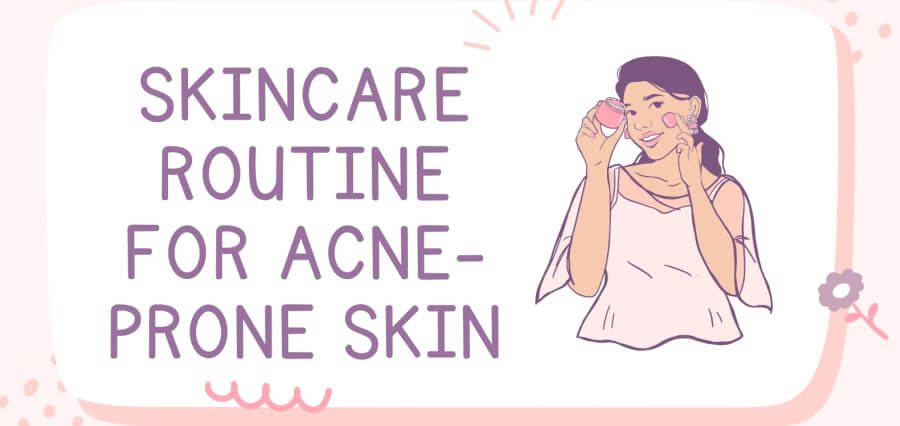Acne-prone skin can be hard to take care of. Dermatologists can help you develop a good skincare routine. It will help you control breakouts and improve your skin’s health in a big way.
Dermatologists know what causes acne to start in the first place. If you have skin that breaks out. You must choose the right products and use them.
This article will help you learn how to make a good skincare routine. For acne-prone skin, including how to cleanse, tone, treat, and prevent breakouts.
What Is Acne, Who Can Get It, And What Causes It?
Acne develops as a skin condition when there is a clogging of hair follicles and dead skin cells. The results are whiteheads, blackheads, or pimples. Although it can affect anyone, teenagers are the age group where acne is most common. Visit a dermatologist near you today to avoid acne.
What Do Dermatologists Suggest for Skin That Is Prone to Acne?
Consider the following suggestions:
Topical Medication
Retinoids medications: Medications containing retinoic acids or tretinoin are helpful for moderate acne. These are lotions, gels, and creams.
Antibiotics: These kill extra skin bacteria and lessen inflammation and redness. You might use a retinoid and an antibiotic together for the first few months of treatment. Applying the antibiotic in the morning and the retinoid in the evening.
Adding benzoyl peroxide to antibiotics to lessen the possibility of antibiotic resistance. If you are not allergic to antibiotics, ask your dermatologist about skin cancer if you are non-allergic to antibiotics.
Acids azelaic and salicylic: A yeast produces azelaic acid, an occurring acid. It’s got antibacterial qualities. When applying twice daily. The cream or gel containing 20% azelaic acid is as effective as many common acne treatments.
Dapsone: If you encounter inflammatory acne, especially in women. You can use dapsone (Aczone) 5% g twice daily.
Oral Medications
Antibiotics: You might need oral antibiotics to reduce bacteria if you have moderate to severe acne.
Antiandrogen medications: It functions by preventing androgen hormones from having an impact on the oil glands.
Isotretinoin: Isotretinoin (Amnesteem, Claravis) is a vitamin A derivative, among other medications.
Therapies
Light therapy: Try many light-based treatments. The majority will cause many trips to your doctor’s office. You might need more research to determine the ideal procedure, light source, and dose.
Chemical peel: During this procedure. During this procedure, you may apply salicylic acid, glycolic acid, or retinoic acid. This procedure treats mild acne. It might make the skin look better. But the improvement is usually temporary and requires additional treatments.
Drainage and extraction: The comedones or cysts don’t go away after applying topical medications. The dermatologist for the skin may remove them using specialized tools. While this method makes your skin look better, it also runs the risk of leaving scars.
Steroid injection: Use steroid drugs for nodular and cystic lesions to treat them. Rapid improvement and a reduction in pain are the outcomes of this therapy. The side effects are thinning and discoloration in the treated area.
Best Tips from Dermatologists for Caring for Acne-Prone, Oily Skin
Every day, wash your face in the morning, evening, and after exercise. Avoid the urge to scrub your skin while washing, not even to get makeup off. Scrubbing aggravates skin irritation and can make it worse.
Do opt for skin care items. Bear the “oil-free” and “noncomedogenic” labels. These include cleansers, moisturizers, and makeup. These items won’t clog your pores or result in acne.
Do wash your face with soft, foaming soap. Many people think they must use a potent face wash for oily skin to dry out their skin. But using a face wash that is too abrasive can irritate your skin and cause it to produce more oil. Find a gentle, mild face wash instead.
Avoid using alcohol- or oil-based cleansers. These might cause skin irritation.
Do use a moisturizer every day. Even if you have oily skin, use moisturizer to keep your skin hydrated. Look for a moisturizer with a high broad spectrum. Apply sunscreen protection (SPF) of 30 or higher to save time and shield your skin from the sun’s damaging ultraviolet rays.
Sunscreen is a must when. Utilizing sunscreen can help stop sun damage that could cause skin cancer age spots. Avoid sunscreens with fragrances or oils. Also, look for zinc oxide and titanium dioxide products to prevent acne outbreaks.
Do select water-based, oil-free makeup, and avoid sleeping with your makeup on. Take off your makeup before going to bed.
Do make use of blotting papers all day long. To absorb the oil, press the form against your face. The oil will spread to other areas if you rub the paper on your face.
Despite the temptation, resist touching your face throughout the day. Touching your face can cause your hands to release bacteria, oil, and dirt onto your face. Ensure you cleanse your hand before touching your face. Moisturize or apply sunscreen or makeup.
According to a survey of 2,000 Americans, the most common “skin sin” is not washing their faces at night, essential for removing dirt and oil accumulated during the day.
What Treatments Do Dermatologists Use for Oily Skin?
Consider the following treatments from a dermatologist for oily skin.
Wash Your Face Twice a Day
Even though this may seem obvious, oily skin can avoid further breakouts and clogged pores by using a cleanser every morning and at night and removing all makeup at the end of each day.
Use A Toner
Allawh says a face toner removes excess oil, dirt, and makeup. Other debris could clog skin pores. Frequent washing might irritate people with sensitive skin. Use toners as an alternative method of cleansing the skin on the face.
Incorporate Vitamin C And Hyaluronic Acid Serums into Your Routine
Apply an antioxidant serum, such as vitamin C, before moisturizing in the morning. This is to give your skin a radiant glow.
Apply Moisturizer Twice a Day
After cleansing, your skin needs moisture; if you do this twice daily, use moisturizing cream more often.
Best Advice from Dermatologists in Treating Acne
Chemical Peels
People who suffer from acne will turn to chemical peels as a treatment. Sometimes a chemical solution is applied to the skin during this procedure, causing the top layer of dead skin cells to peel away and reveal smoother, cleaner skin underneath.
Intense Pulse Light Therapy
IPL, also known as intense pulsed light therapy, is the following procedure. It targets the bacteria on your skin, the main contributor to cystic acne.
Low-Level Laser Therapy
Lasers are used in this cutting-edge procedure to gently penetrate the skin and get to the root causes of those annoying breakouts. The laser’s function is to ignite the skin cells that repair and renew your skin, which helps to lessen the appearance of acne and encourages a more transparent, more even complexion.
Best Acne Prevention Skincare Routine Tips from Dermatologists
Wash your face with a gentle foaming cleanser in the morning. Remove any scratchy sponges, washcloths, or other items, and only use lukewarm water.
Use a medication to treat acne. Try an over-the-counter treatment after letting your skin dry by patting it rather than rubbing it.
Apply a non-greasy moisturizer. Moisturizers aid in the regulation of the skin’s oil production.
Remember to sunscreen. Select a sunscreen that won’t clog your pores or worsen your breakouts.
Cleanse again at night. When you cleanse at night, you need a cleanser that can delicately remove the dirt, oil, and makeup accumulated on your face throughout the day.
How To Build the Best Acne Skin Care Routine
Cleansing: To prevent clogged pores, dullness, and acne, wash your face twice daily, morning and night.
Toning: After cleansing and before applying anything else, use toner.
Treating with serums: Serums are influential allies for the skin. Because they have concentrated amounts of active ingredients, these elixirs can eliminate wrinkles and dark spots.
Moisturizing: A moisturizer primarily aims to hydrate and soften the skin.
Protect With Sunscreen: Dermatology services advise using a daily moisturizer with a built-in broad-spectrum SPF of at least 30 to make it easy to remember.
Final Thought
Keep your skin healthy, bright, and in good condition. A good routine can help you repair wrinkles, prevent acne, and keep your skin looking great.
| Read More Articles: Click Here |















